All too soon, it was time to move on. We had very much enjoyed our stay in Cape Verde, being very surprised by the places we had visited. We would have liked to have stayed longer and visit the other islands, but Leg 2 start day was drawing ever closer.
The pontoons became a hive of activity, with last minute checks, repairs and ‘top up’ provisioning. Everywhere we looked the walkways were covered in brightly coloured fruit and vegetables, newly washed (to help eliminate bugs) and drying in the sun before being carefully stowed aboard. Every available space was used and many boats had large hammocks of fruit and veg to help store the provisions needed.
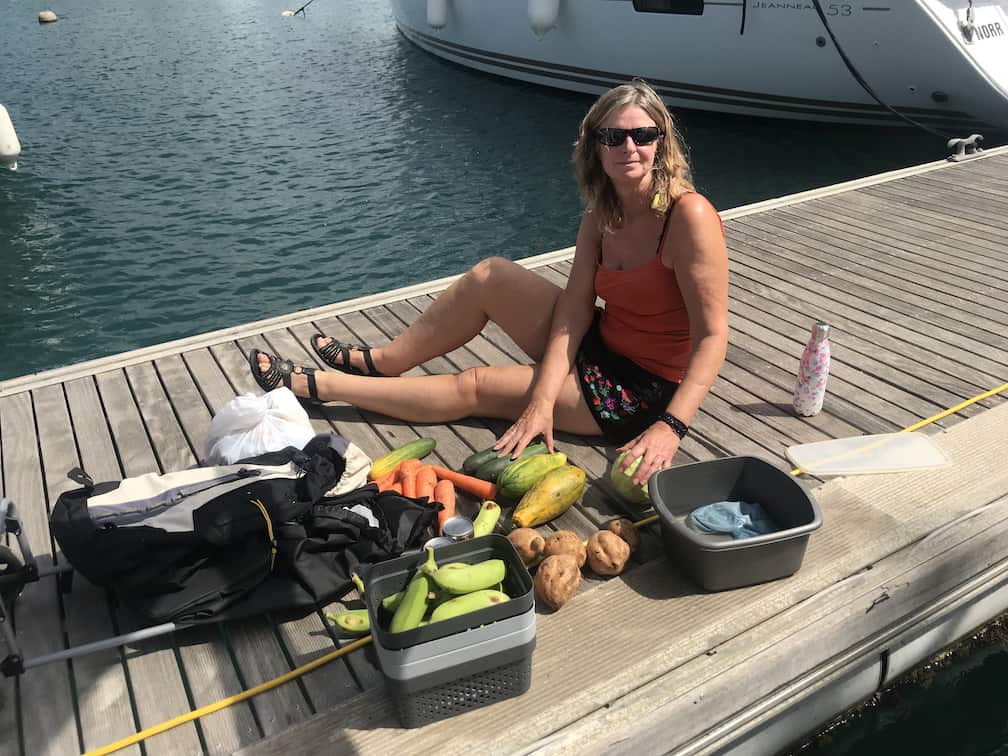
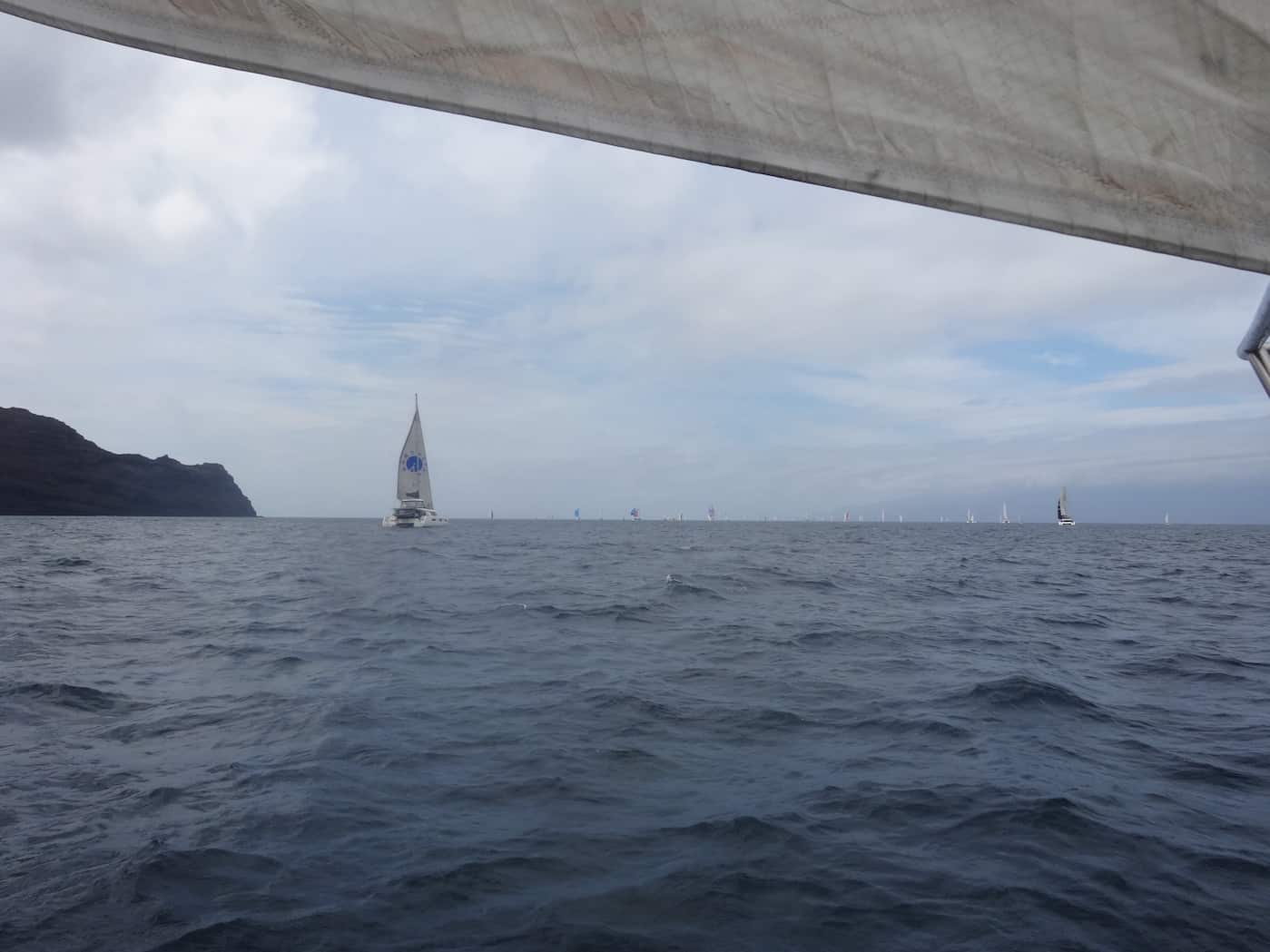
Friday 19th November 2021 was start day. One by one the boats left the marina, putting up their sails and slowly making their way towards the start line. As with Leg 1, the ARC+ Rally control boat was on hand with hoisted flags and loud horns to count us down. Finally, at 11:30am, the fleet set off again, all heading across the Atlantic to Grenada.
The straight line route from Mindelo to Grenada is 2200nm, but, this is sailing, so all of the boats had checked weather forecasts and planned the best routes for them. All of the forecasts were predicting very light winds, especially further north, so most of the fleet headed south/south west to try to ensure some wind later in the trip.
The first day was excellent sailing at with winds of Force 3 (12 – 19 knots) at 90 degrees to the boat. We made good speed (6 knots) down between the islands of St Vincente and Santo Antao.
It was lovely to see the other boats around us, many flying their light weight coloured sails, knowing that we were all heading the same way.
Although there were 75 yachts on the rally, after only few hours, they were spread out enough to make it unusual to see anyone else. Occasionally, one or two of the nearby (up to 15 miles) boats would be picked up by our AIS. But otherwise it just us, the sea and sky.
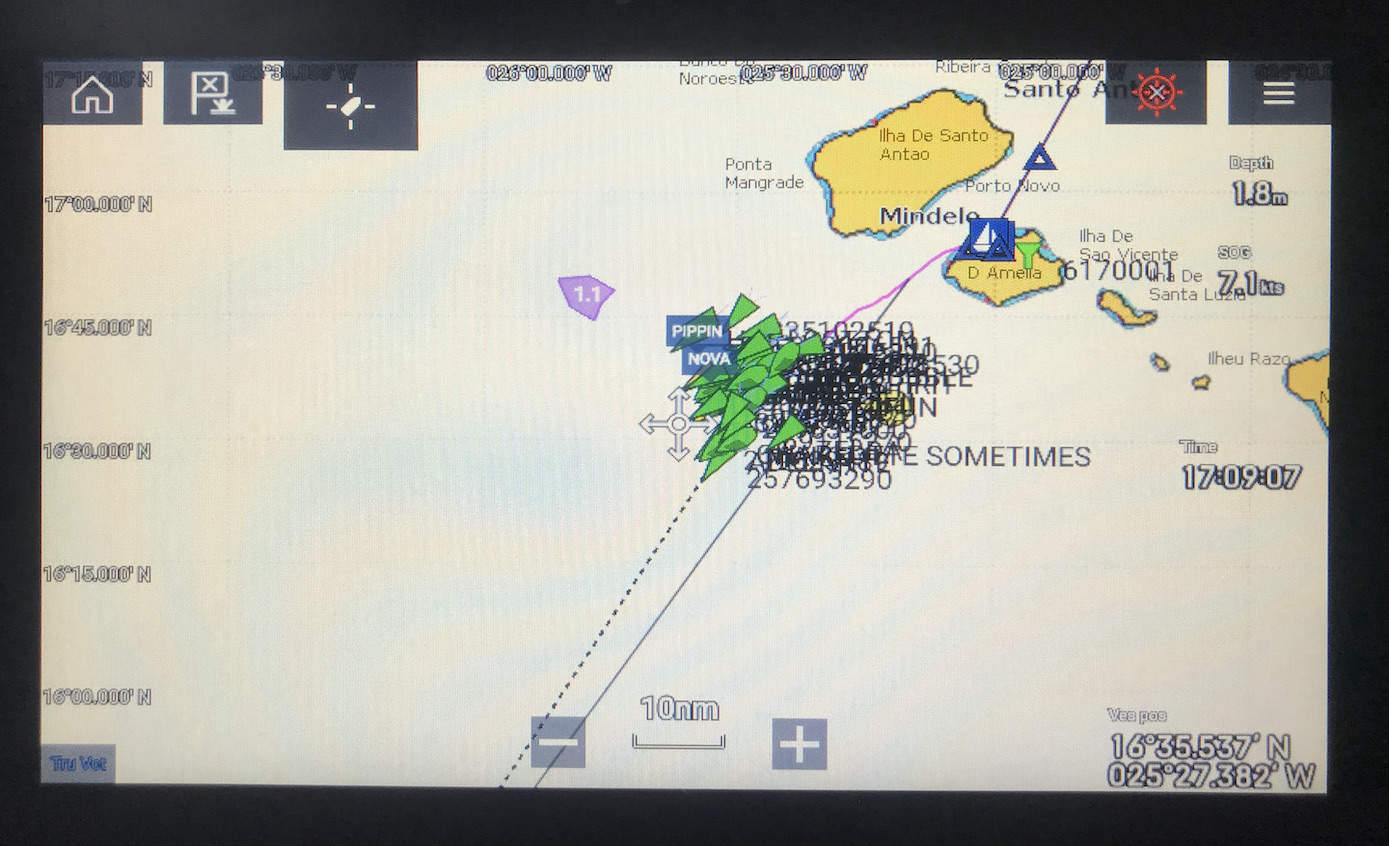
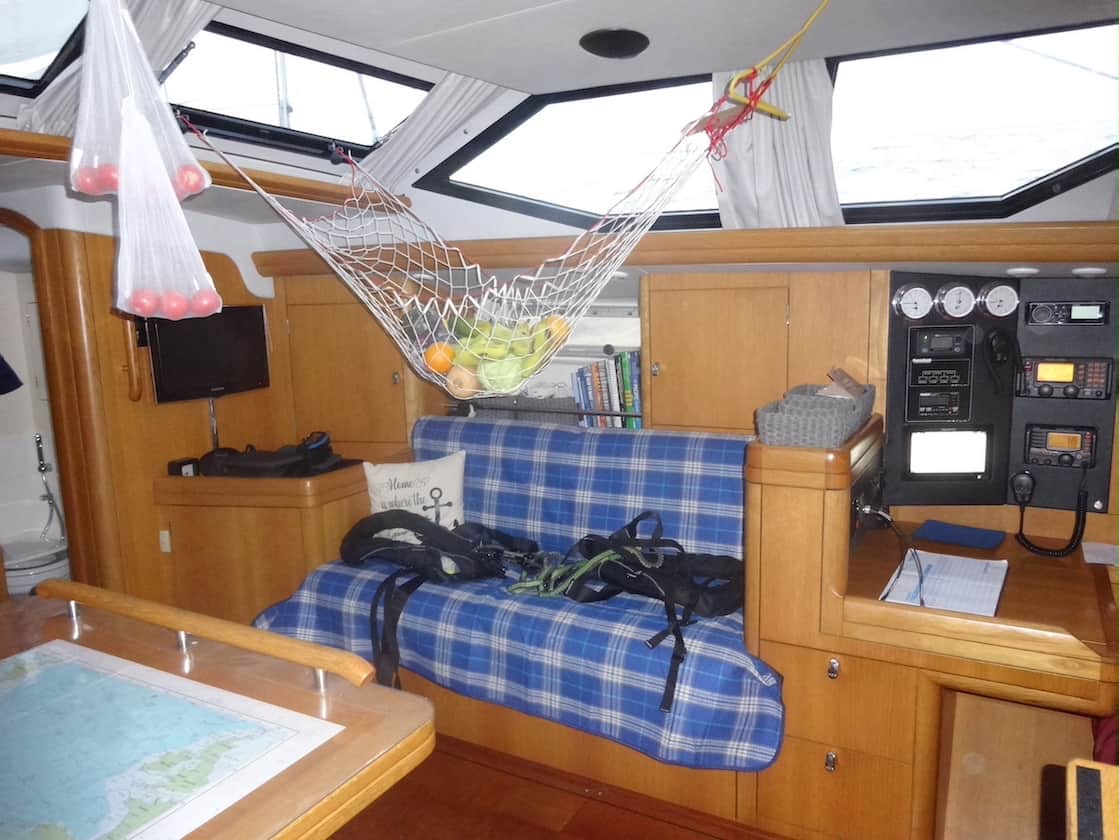
The passage continued well. There were very few direction changes and, within a few days, we had settled into a more relaxed daily routine.
Everything we do on passage is more difficult than ashore. The boat is always moving, sometimes quite significantly, and we have to move around more slowly and much more carefully. To do anything, even very simple day to day tasks, we usually have to be braced in place or holding on and working one handed.
As the boat rocks, good stowage is crucial. Anything left out is a potential hazard as, at best, it slides across the surfaces and, at worst, it is thrown off the shelf or table. All of our lockers (cupbaords) have stretch netting across the front of them and there is non-slip mat everywhere.
When on a longer passage, it is important to ensure that the crew all get rest time and each boat has their own preferences for doing this. Some boats have a strict rota, day and night of two, three or four hours on watch. Over time, we have tried out different patterns and have found one that works best for us.
During the day, there are no set watch times. We are both generally awake and, depending on what the other person is doing, we informally take turns to keep an eye out. We will both normally have a short sleep at some point during the day to top up our batteries, and our watches ‘proper’ start at about 9pm. By this time, we have eaten our evening meal, the pots have been washed (and put away) and the sails have been set for the night’s sailing. I take first watch for about 4 hours and then Martin the next four – although these can be shortened or extended depending on need. This gets us through until about 0500/0530, at which point Martin tends to settle down for another couple of hours and I get a cup of coffee and wait for the sun to rise.
The person on watch has various tasks to do, generally involving keeping an eye open: other boats, changes in wind speed or direction and, of course, squalls.
On one of my watches, I had to change course to miss a large fishing boat with long nets out behind it. It didn’t come up on AIS, but luckily it was very well lit, so could be seen from several miles away.
I also had to furl the Genoa several times due to oncoming squalls. These can appear very suddenly and can result in sudden changes in wind strength and direction and very heavy rain.
In both of all of our on watch tasks, we are helped significantly by excellent electronic systems – the auto pilot will drive the boat once you have told it where to go, AIS spots any other boats in the area transmitting a signal and the radar is invaluable for identifying squalls.
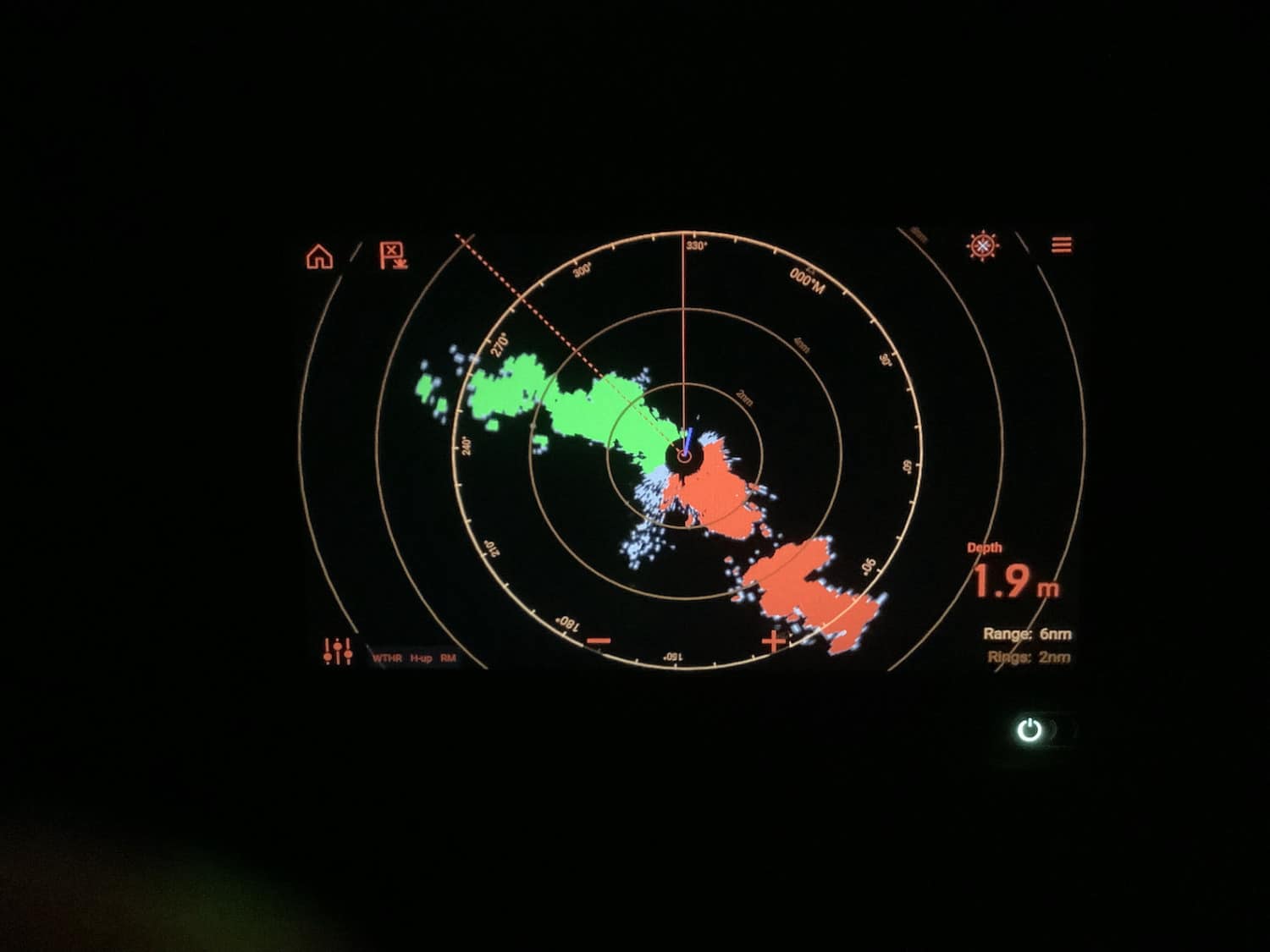
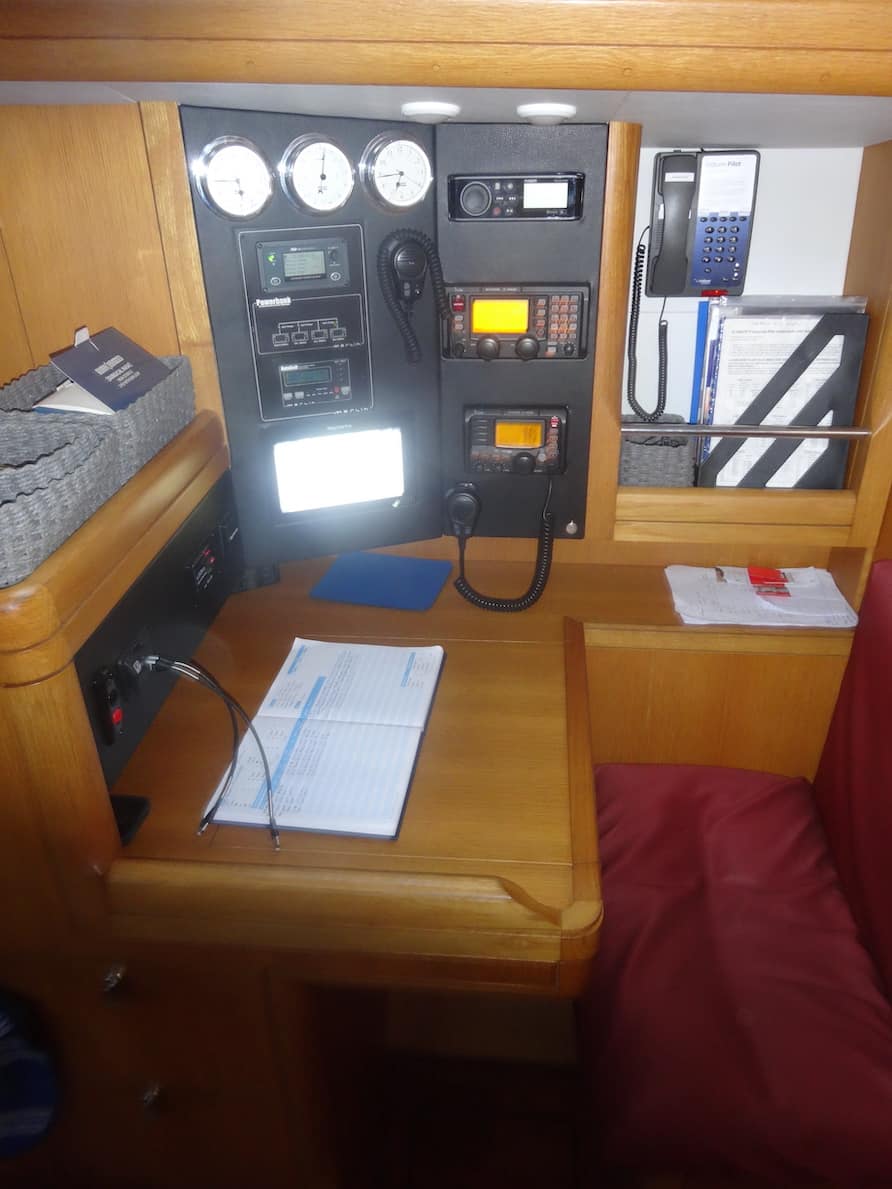
Having spent a lifetime in a job surrounded by people, it takes some adjusting to there being just the two of us. Something that helped enormously was the ability to communicate with other boats by radio. On Escapade, we can use our VHF radio to talk to anyone within a range of up to 15/20 miles. But we also have an SSB radio which enables us to talk to boats much further away – as long as they have SSB too!
This year on ARC+ there were 23 boats with SSB and we had a twice daily catch up on SSB radio net. During these times, we could check out where everyone was, find out what the wind was doing and hear about what had been happening on board. “News’ included broken equipment, good food eaten, catching fish and special occasions. It was quite strange forming friendships with people by their boat name!
As mentioned above, once on passage we rarely see anyone, even on AIS, so our view from the cockpit is sea and sky with the ocassional wildlife. This trip was no exception.
Martin continued to fish and caught three fish – unsure as to what they were, but they were very tasty. He also caught a seabird who tried to eat the squid lure and a tree that happened to be floating by mid Atlantic!
We also had many flying fish land on the boat and were fortunate enough to see dolphins, pilot whales and even a couple of orcas.
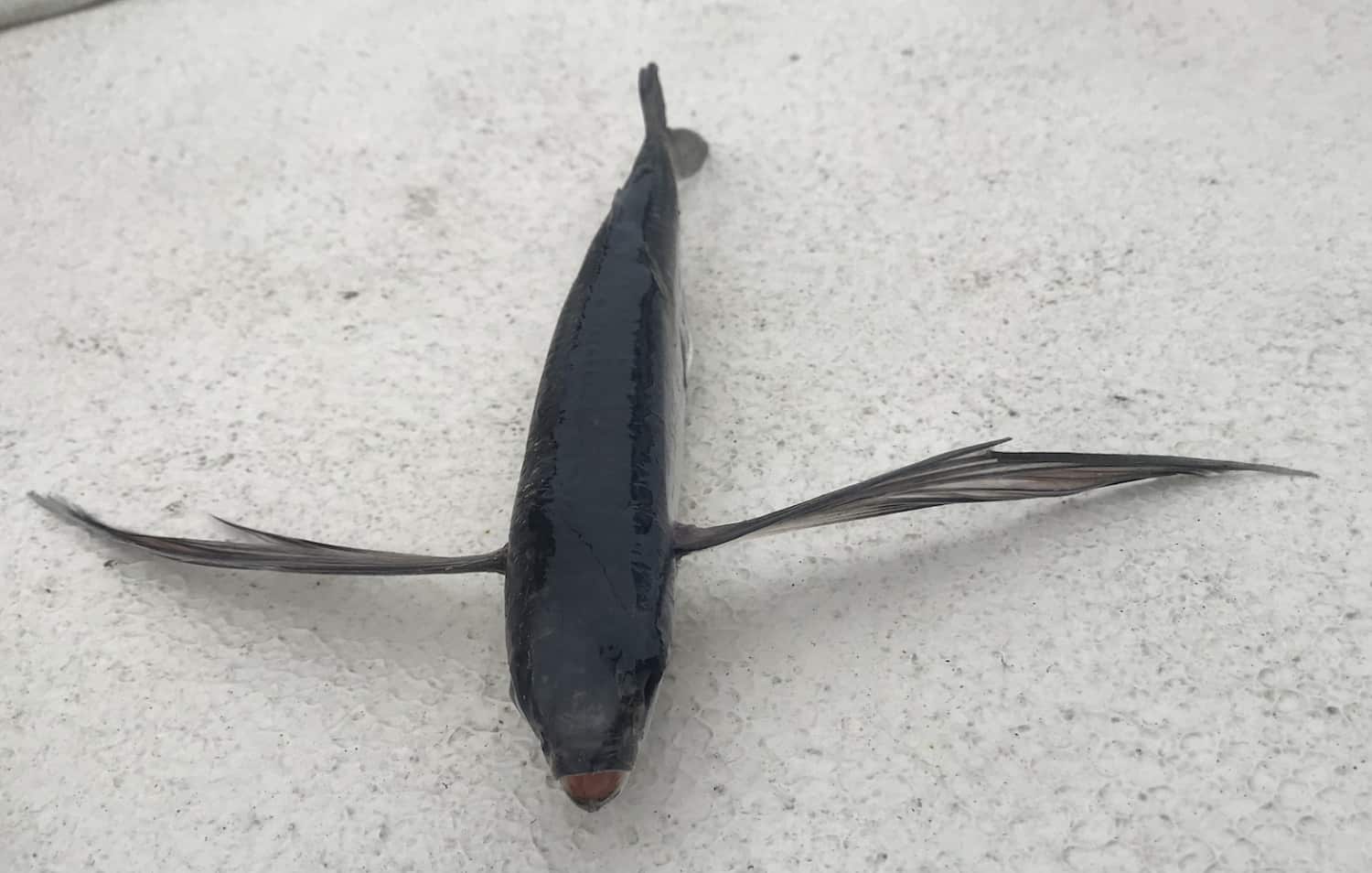
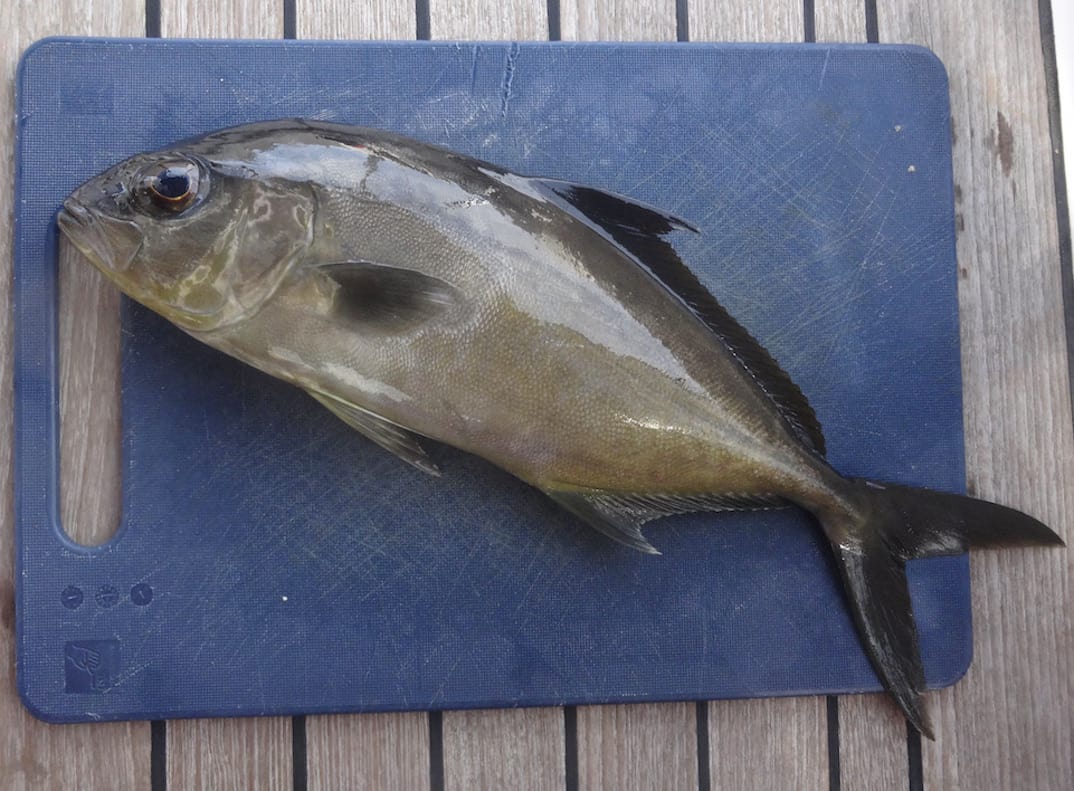
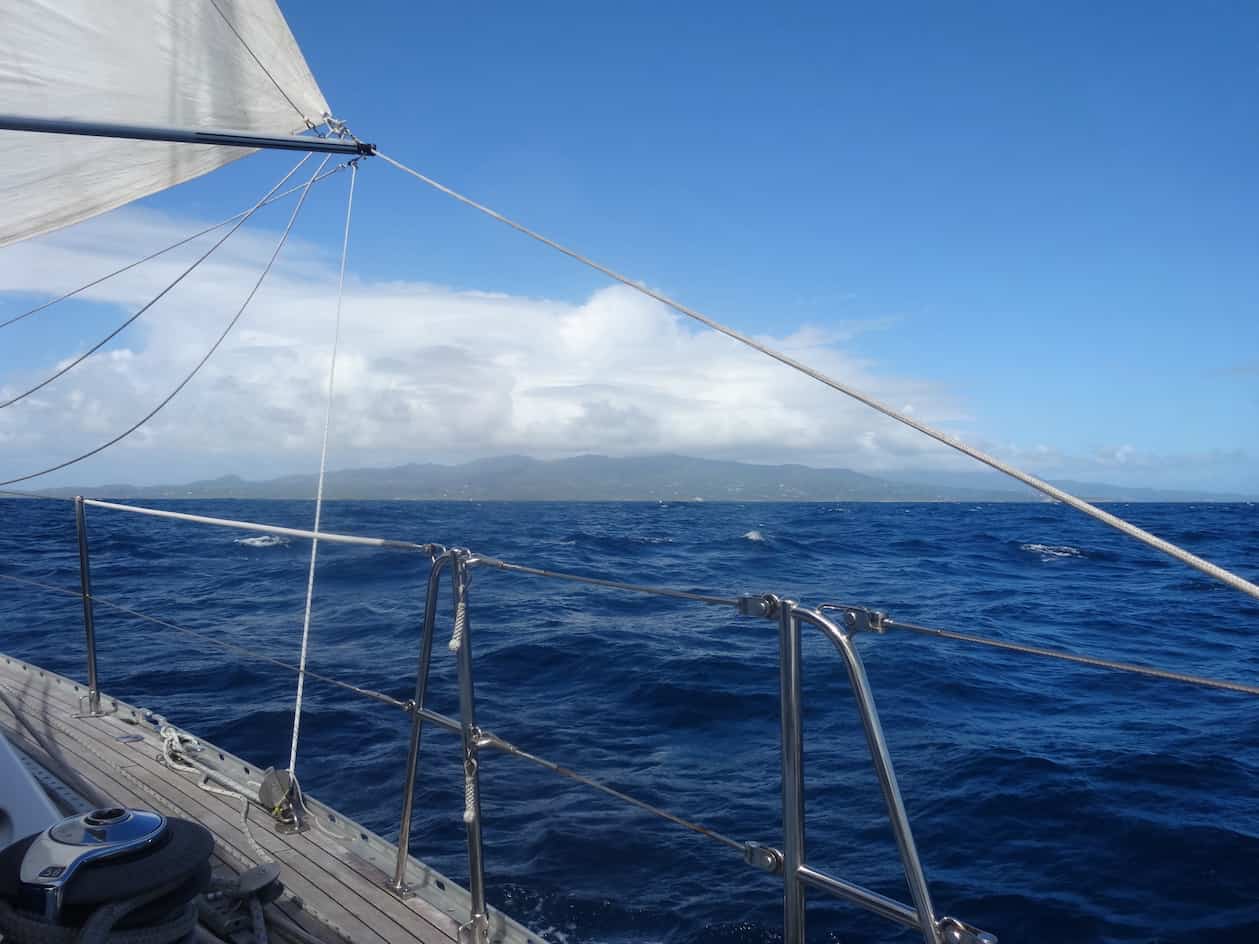
Before we knew it, we were into our final days. Eventually, after 16 days, 4 hours 40 minutes and an epic 2295nm, we arrived in Grenada.
Arriving at Port Louis Marina in St Georges, we were met at the quarantine pontoon by one of the yellow shirts. He quickly helped us check in with health checks and then immigration and customs. (Many thanks to the officials who stayed later on Sunday afternoon)
Formalities completed, we moved to our pontoon to be greeted by Marina manager Zara and Pure Grenada tourism. Many thanks for the excellent bag of goodies and rum punch!! Hello Grenada…
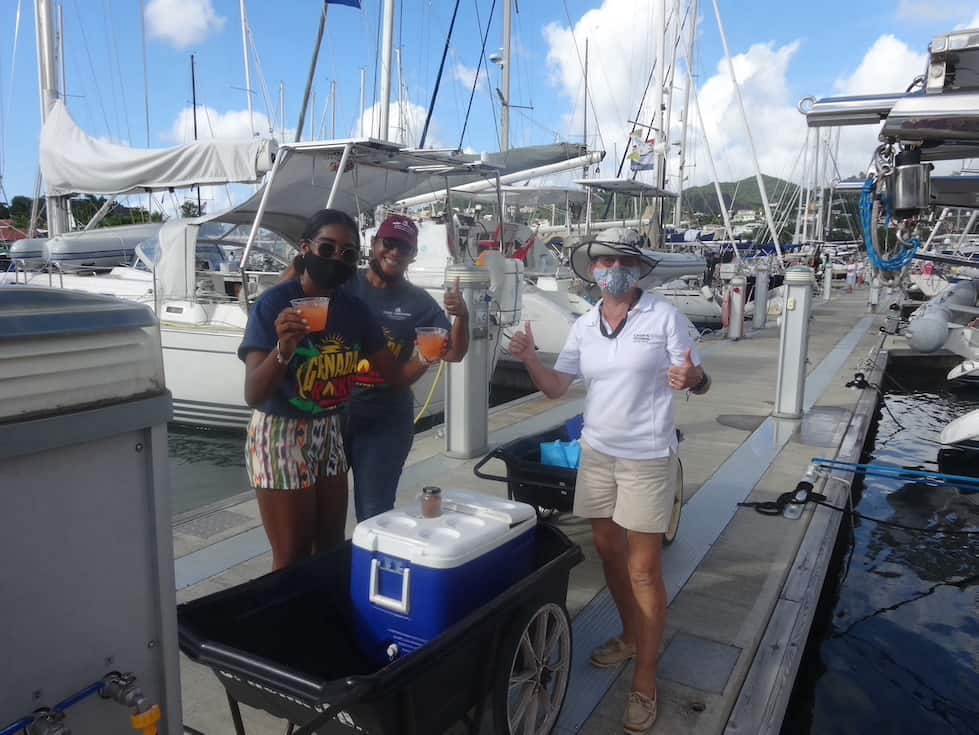
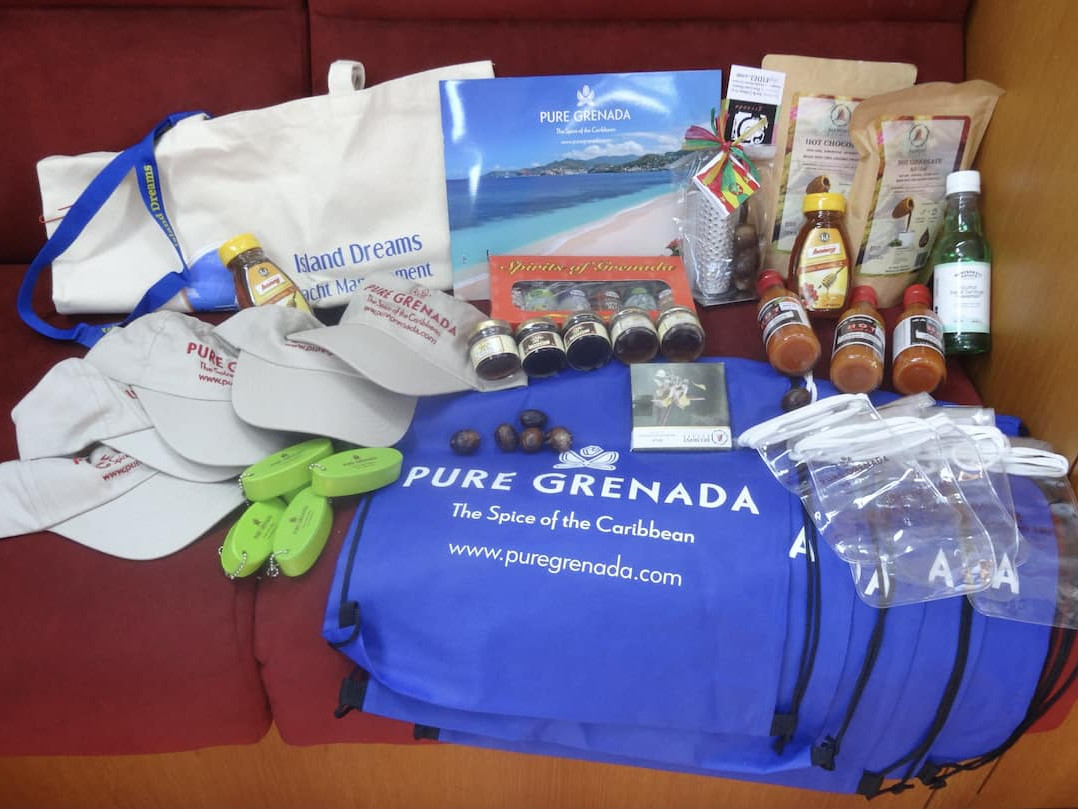
Pictures are great,
Happy New Year to you both
Happy Sailing
Happy New Year to you too! Hope all is well and it is not too cold.
All good here in the Caribbean sunshine.
Pleased you like the photos.
After 16 days at sea, I bet it was an amazing feeling to see land. Did you have jelly legs once on dry land? Sea legs or rum punch legs🤣
Hi,
Happy New Year!
We were definitely ready to get there and have a reasonably stable home for a while.
Yes we had jelly legs for a while and it was most certainly not just the sea legs!
Hope all is well with you.
Xx
Wow! A big achievement. 16 days! Did all your systems and modifications work out?
Hi,
Happy New Year!
We were proud to have done it and reasonably quickly too.
Escapade was amazing and looked after us very well. So far we have been really pleased with the way we have set her up and all is working as planned…fingers crossed it continues.
Hope you have exciting plans for 2022
Stay safe xx
Glad to hear that all went well! Where to next??
Hi,
Happy New Year and belated happy birthday to Ali. Very grown up now!
All good here. We have been in the Caribbean for just over a month now and are having a great time exploring Grenada and now the Grenadines. More pictures to come!
Hope all is well with you
Stay safe xx
Wonderful to read these accounts – much more interesting than the Head Teacher’s Report ever could be. Great to hear that the methodical and thorough planning and preparation has worked so well for you thus far, and that ARC+ is proving so beneficial. Looking forward to reading more as the great adventure unfolds.